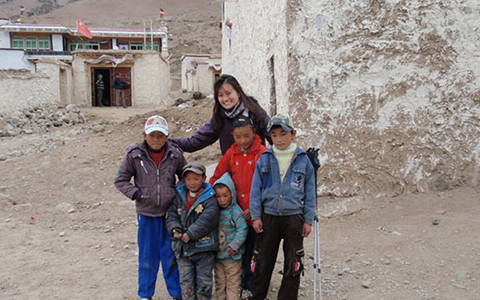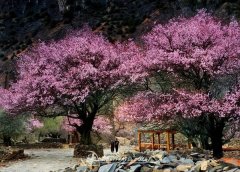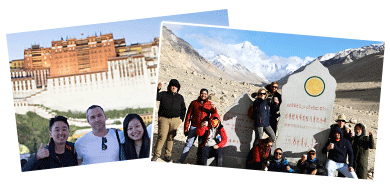
Tibetans' Ecological Ethic Brings Harmony Between Humans And Nature
Tibetans' Ecological Ethic Brings Harmony Between Humans And Nature
Qinghai-Tibet Plateau is the birthplace of the Tibetan people, and the place with the most Tibetans living there. From the geographical point of view, the Qinghai-Tibet Plateau is a relatively independent geographical unit. Its original ecological environment occupies a special position in the world, and has an important influence on Asia’s or even the global climate. Therefore, to build the Qinghai-Tibet Plateau ecological safety barrier has become a worldwide concern.
In the unique environment of plateau, Tibetan people have to solve the conflicts between human beings and nature, which also the survival problems of them. They have to think about the position of human being in the nature and how to handle the relationship between humans and other animals. With in-depth thought about these problems and their practices, the cosmology and view of nature of Tibetan people has been formed, which is also called ecological ethics. Tibetan people's ecological ethics help to establish the values of equality and harmony between humans and nature, and directly influence the eco-environmental behavior of Tibetans.
Since the 5th century BC, Bonism, Tibetan's primitive religion, has taught Tibetans to believe the animism and worship gods of nature. With the influence of the "animism", people are believed to be among spirits and deities, and there appear many gods such as those of mountain, water, land, heaven and so on. As a result, people have a deep sense of awe to the nature. They treat natural objects and forces of nature as objects with life will and great energy. Bonists also believe that all creatures of nature are an indispensable part of the universe, and they should have their survival position and rights. Obviously, this kind of understanding about man and nature appear relatively immature, but we can see that they have initiatively thought of the relationships between humans and natural environment, between men and the surrounding existences. They have tried to seek their own peace through protection of the environment and all beings
Since the mid-seventh century AD, Bon religion has play an important role in the formation and development of Tibetan Buddhism. Its ecological theory has been inherited and developed. Tibetan Buddhists believe the existence of mankind and all things depend on each other. It believes all being are equal and the right of existence should be respected. The source of human beings is in nature and their dwelling is the gift from nature. According to Tibetan Buddhism, humans have rights to use the natural resources but they have to use rationally and be grateful. Thus, human beings couldn't loot and destroy the nature freely, but protect it with a sacred awe. The karma theory of the Buddhist reminds people that to be kind to nature is kind to human beings and those who destroy nature would destroy themselves. These ideas of Tibetan Buddhism have had a profound influence on Tibetan people.
Fundamentally speaking, it is a cultural choice to respect life and adhere that all beings are equal. It is a well-matched cultural pattern for Tibetans to adapt to their own living environment on the basis of knowing nature and respect its laws. It also could be seen as a stable way of living and behavior of survival through historical choices. At the same time, a number of taboos formed on ecological protection are also a summary of aesthetic experience and rejection of evil and the ugly. In thousands of years, the practice of protecting the ecological environment of the Tibetan people fully reflects the respect for life, adherence to the basic idea of the equality of all living beings.
In Tibetan areas, there are always some sacred mountains and trees wherever you go. In fact, those mountains and trees are the original existence of nature. But to those with love to the nature, they are personified and deified. Tibetans made beautiful legends for those mountains and lakes. They give rich cultural connotations to those existences, and make them carriers of the divine and poetic nature. On the sacred mountains or besides the holy lakes, the eye-catching Mani Stone Mounds and fluttering prayer flags convey the communication between human beings and nature. In fact, those sacred mountains and the holy lakes themselves are the promises given by Tibetan people to protect nature. They also express their respect for nature and improve the people's protection awareness through religious activities.
In recent years, Tibetans' original ecological ethics has been stressed by the government and some NGOs, such as the Shanshui Conservation Center. Relative projects have been carried out with the investment of government, such as the Pendeba program in the Qomolangma National Nature Preserve, and new ways of win-win development of economy and environmental protection are being explored.

With exceptional passion and outstanding leadership, Mrs. Catherine has dedicated herself to Tibet inbound tourism and China tour for 15 years. As one of the handful females who see great potential of Chinese inbound tourism, Catherine has made great contribution to promoting Tibet tourism and enhancing the employment of Tibetans and prosperity of local Tibetan community.
Over the years, she travelled overseas with Tibet Tourism Bureau many times to promote Tibet tourism. Currently, Catherine works as the marketing director of Tibet Vista, an opinion leader behind the whole team of Tibet Vista.
Related Articles & Posts

Latest Tibet Travel News

Tibet Vista: A Social Responsible Tour Organizer
Aug 14,2023

Tibetan Monks Debate in Drepung Monastery
Jun 10,2023

Tips for Traveling to Tibet in Spring
Feb 17,2022

Snow Will Hit Qinghai-Tibet Plateau
Feb 17,2022


.jpg)




0 Comment ON "Tibetans' Ecological Ethic Brings Harmony Between Humans And Nature"